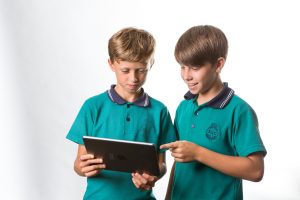Stage 3 (Years 5 and 6)
iLearn@EAC Program
 ‘iLearn@EAC’ is an innovative approach to teaching and learning that is designed to engage students in great experiences that embrace the latest technological tools and provide opportunities that cater for different student learning needs.
‘iLearn@EAC’ is an innovative approach to teaching and learning that is designed to engage students in great experiences that embrace the latest technological tools and provide opportunities that cater for different student learning needs.
A key component of the ‘iLearn@EAC’ program involves the integration of iPads into the day to day learning experience of the students. They have access to the vast array of apps and online learning tools available through the internet and the Apple platform. Technology promotes a high level of engagement for all of our students.
English
Our English program is made up of the following areas:
- Speaking and Listening
- Reading and Viewing
- Writing and Representing
- Grammar, Punctuation and Vocabulary
- Thinking Imaginatively and Creatively
- Expressing Themselves
- Reflecting on Learning
Each day our students participate in a variety of literacy tasks. The main focus of these tasks is to develop our students’ reading, writing and communication skills.
Speaking and Listening - Students are encouraged to be active learners. They participate in daily discussions with peers and teachers. During the term, students plan, rehearse and deliver presentations to their peers relating to topics covered in both English and other Key Learning Areas. All Stage 3 students participate in debating.
Reading and Viewing - Each day the students are given the opportunity to read. The mechanics of reading and comprehension skills are explicitly taught. In addition, students are encouraged to select their own reading material and engage in independent reading for their own enjoyment. Students participate in a variety of novel study tasks that relate to the text they are currently reading.
Writing and Representing - Writing is taught through modelling the writing process and encouraging the use of correct grammar, punctuation and spelling. Students are given the opportunity to create informative, persuasive and imaginative texts. The classroom provides an environment where students can write independently and collaboratively with peers.
Students are encouraged to think creatively and express their ideas through a variety of means. We believe all students play an active role in the learning process.
Mathematics
Our Mathematics program is made up of the following areas:
- Working Mathematically
- Number and Algebra
- Measurement and Geometry
- Statistics and Probability
All students participate in mathematical investigations in class. Students are encouraged to ask questions, use known facts and concrete materials to explore mathematical problems. They communicate their ideas with both their peers and teachers.
A sequential Mathematics program is taught throughout the Primary School.
History
Students explore the significance of people, groups, places and events to the development of the Australian colonies and Australia as a nation. Students investigate the factors that led to Federation and trace experiences of democracy and citizenship over time, including the struggles of various groups for rights and freedoms including Aboriginal and Torres Strait Islander peoples. Students engage with global connections through stories of various migrant groups and their contribution to Australia's economic and social development.
Geography
Students explore the diverse characteristics of places in different locations across local and global scales. They investigate interactions between people, places and environments and compare spatial distributions and patterns among phenomena.
Science
Students play an active role in scientific investigations that focus on the following areas:
- Physical World
- Earth and Space
- Living World
- Material World
- Built Environments
- Information
- Products
- Working Scientifically
- Working Technologically
Creative Arts
Art, Dance, Drama and Music are all included in the Creative Arts program.
- Students are encouraged to express their ideas creatively using a variety of media. Artworks that are created often reflect what students have been leaning in class.
- Music is taught by a specialist teacher each week. Students participate in practical activities using a variety of instruments as well as developing a foundation in music theory.
- Drama is integrated with many of the other Key Learning Areas, particularly English. The students enjoy acting out stories and role playing everyday activities.
- Dance is a part of the Physical Education program, which is taught by the specialist teacher.
Personal Development and Health
Personal Development, Health and Physical Education is based on a broad notion of health that encompasses all aspects of an individual’s wellbeing, inclusive of social, mental, physical and spiritual health. It encourages students to develop knowledge, understanding, skills, values and attitudes that will enable them to lead healthy and fulfilling lives.
Physical Education is taught by a specialist teacher each week.
Religious and Values Education (R.A.V.E)
Religious and Values Education forms the corner stone of life at Emmanuel Anglican College. Students from Kindergarten to Year 10 are involved in a classroom based program each week. The students also meet each fortnight for chapel services and the College meets as a whole twice a term to share in worship at St Mary’s Anglican Church.
The R.A.V.E program aims to:
- Introduce students to key Bible stories and characters.
- Explore the Christian way of life, focusing on values such as compassion, respect, honesty, kindness and generosity.
- Outline Christian beliefs about the nature of God, the significance of the life, death and resurrection of Jesus and the concept of faith.
Japanese
Students engage in the cultural and linguistic diversity of our world through participation in a Japanese language acquisition lesson each week. During this lesson the students learn about Japan’s culture, the country and language.
